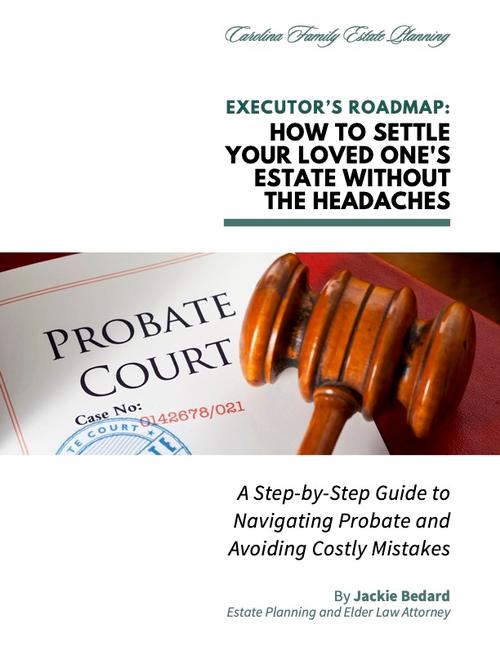
When a loved one passes away, their choice of executor is often a deeply personal one. They chose you because they trust you. But what happens when that trust comes with the added complexity of distance? If you live outside of North Carolina and have been named the executor of a will for a loved one who resided in the state, you're facing a unique set of challenges.
This guide will explain the key requirements, steps, and pitfalls for non-resident executors in North Carolina. While the process may seem daunting, with the right information and professional guidance, it is entirely manageable.
A Common Scenario with Unique Challenges
It is a common scenario: a parent who lives in North Carolina names an adult child who moved to another state as their executor. Or a sibling in Virginia is named the executor for a sibling who passed away in Raleigh. The question that immediately comes to mind is: "Can I even do this from so far away?"
The Initial Question: Can I even do this?
The short answer is yes. North Carolina law does not prohibit a non-resident from serving as an executor. As long as you meet the basic qualifications, such as being at least 18 years old and competent, you can be appointed by the Clerk of Superior Court to administer the estate.
The Logistics and Legal Hurdles
While it's possible, being an executor from a different state comes with additional responsibilities. You'll need to navigate a new state's legal system, manage estate assets that are hundreds of miles away, and coordinate with local banks, real estate agents, and government agencies. Fortunately, the law provides a clear framework to make this possible without requiring you to move to North Carolina.
The North Carolina Requirements for Non-Resident Executors
To be appointed as an out-of-state executor in North Carolina, you must meet a few specific legal requirements in addition to the standard ones.
The Role of the Resident Process Agent
Under N.C. Gen. Stat. § 28A-4-2, a non-resident personal representative (another term for an executor or administrator) must appoint a resident process agent. This is a person or corporate entity that lives or operates in North Carolina and agrees to accept official legal documents on your behalf. This ensures that the court, creditors, or other interested parties can serve you with legal notices without you being physically in the state. Many non-resident executors hire an attorney to act as their resident process agent.
The Surety Bond Requirement
A bond is a type of insurance policy that protects the estate from an executor's incompetence or dishonesty. While a North Carolina resident executor is often not required to post a bond, it is often required for a non-resident executor unless the will specifically waives it or all beneficiaries consent in writing. In some counties, the court will still require the executor to be bonded even if the will waives such requirement. The amount of the bond is typically one-and-one-quarter times the value of the personal property in the estate, so it can be a significant cost.
Key Differences in the NC Probate Process
The overall North Carolina probate process is the same for residents and non-residents. However, the non-resident's application for Letters Testamentary will include a supplemental oath, and you must file the document appointing your resident process agent. If the decedent owned property in another state, you may also have to deal with ancillary probate, a separate proceeding to administer those assets.
A Step-by-Step Roadmap for Out-of-State Executors
While a lawyer can handle the bulk of the work, here is a general roadmap for the process.
Step 1: Locating the Correct Court
You must file the will and begin the probate process in the county where the decedent was domiciled at the time of their death. The Clerk of Superior Court in that county is the "probate judge" and will oversee the administration of the estate.
Step 2: Filing the Initial Paperwork
The initial filing involves submitting a certified death certificate, the original will, and a completed application for Letters Testamentary. This is also when you would file the document naming your resident process agent and post a bond if required. The Clerk of Court will then review the application and, if everything is in order, issue Letters Testamentary, which officially grants you the authority to act on behalf of the estate.
Step 3: Managing the Estate Remotely
Once you have Letters Testamentary, you can begin the work of estate administration. Your primary duties include:
- Gathering and inventorying assets: This can include bank accounts, real estate, and personal property.
- Notifying creditors: You must publish a notice in a local newspaper and send a notice to all known creditors to give them a chance to file a claim against the estate.
- Paying debts and taxes: You will pay valid claims, as well as final income and estate taxes.
- Distributing assets: Once debts are paid, you will distribute the remaining assets to the beneficiaries according to the will.
- Closing the estate: You will file a final accounting with the court and receive a final discharge from your duties.
Common Mistakes Non-Residents Make
Managing an estate from afar is not a simple task. A few common missteps can complicate the process, costing you time, money, and stress.
Trying to Do It All Yourself
While North Carolina law does not require an out-of-state executor to hire an attorney, it is highly recommended. The Clerk of Superior Court cannot give you legal advice. Trying to navigate the process alone can lead to mistakes that cause delays, court fees, and potential liability. An attorney can handle the local filings, court communication, and complex legal questions, freeing you from constant travel and worry.
Ignoring the Need for an Agent
A non-resident cannot be appointed as an executor without a resident process agent. Trying to file without one will result in a rejected application. You must have this person or entity in place from the very beginning.
Underestimating the Timeline
Probate is a multi-step process that can take many months to complete, especially if there are tax issues, complex assets, or creditor claims. Trying to rush it or underestimating the time commitment can lead to errors and stress.
Your Next Steps: A Path to a Smooth Administration![]()
Being a non-resident executor is a significant responsibility, but it doesn't have to be a nightmare. With the right legal guidance, you can fulfill your duties with confidence and efficiency, ensuring your loved one's wishes are honored and their legacy is protected.
To get a more detailed roadmap of the probate process, download our free guide, "The Executor's Roadmap: A Step-by-Step Guide to Navigating the North Carolina Probate Process."
To discuss your specific situation and get the help you need, call (919) 443-3035. Or click here to schedule a case assessment with our team today.
Frequently Asked Questions
Q: Do I have to be physically present in North Carolina to start probate?
A: In most cases, a North Carolina attorney can handle the initial filing and court communications on your behalf. While some courts may prefer a physical presence for the oath, many will allow it to be done remotely.
Q: What is the difference between a domiciliary and ancillary administration?
A: Domiciliary administration is the main probate proceeding in the state where the person lived. Ancillary administration is a separate, secondary probate proceeding required in another state where the person owned property, such as a vacation home or land.
Q: What if I don't want to be the executor?
A: If you are named as executor in a will, you can decline to serve. This is called a "renunciation." If you renounce your role, the court will appoint the next person named in the will or follow North Carolina's order of priority for administrators.



